What are the side effects of using a mobile phone at night?
Before discussing the science behind the sleep-related side effects of mobile phone use [1], let's examine what the major side effects on sleepers are.
The correlation between smartphones and poor sleep quality brings up a few key concerns, including:
- How smartphone use reduces sleep time
- The effects of blue light
- Social media usage and anxiety
- Smartphones triggering hypervigilance
- The potentially harmful effects of radiation
- Smartphone notifications impacting REM sleep
The first few directly relate to smartphone use before bed, while the last three revolve around how smartphones can negatively affect sleep quality by simply being near you when you sleep.
Let's look at these in more detail in the sections below.
The side effects of smartphone use before bed
To start, let's consider how smartphone usage before bed negatively affects your sleep.
How smartphone usage reduces sleep time
While considering the effects your mobile phone has on the quality of your sleep is one thing, it's also important to consider how smartphone use affects actual sleep duration.
Throughout the night, we undergo 4 to 6 sleep cycles, each with a different purpose.
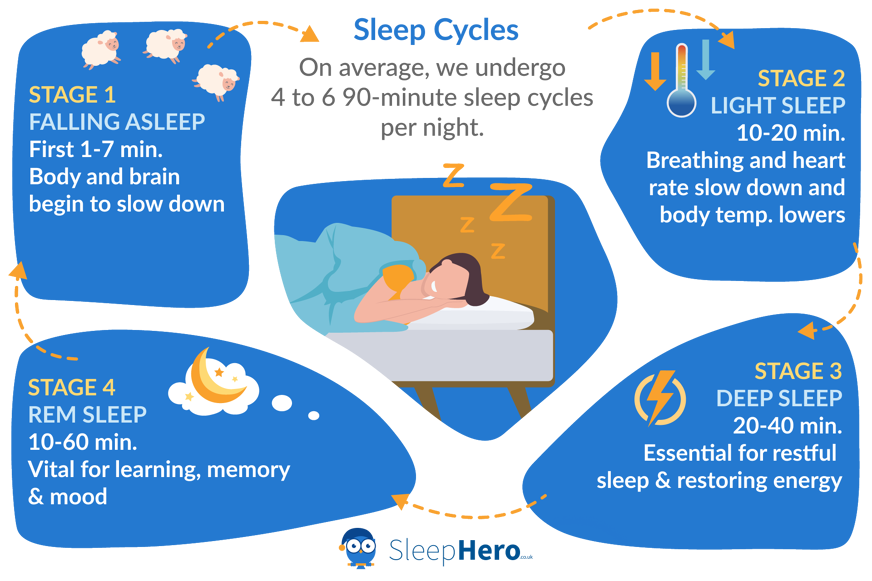
Mobile phones have long become synonymous with daily life - we use our phones to call, text, check directions, chat on social media, play games, read books, listen to podcasts, browse the internet, and so much more.
Listening to a sleep meditation or playing relaxing music from your phone is unlikely to negatively affect sleep quality or reduce overall sleep time.
Unfortunately, many modern social networking apps are designed to provide dopamine hits, making it almost impossible to stop jumping from reel to reel.
Social media use and its so-called "doom-scrolling [2]" keeps users engaged far longer than they'd like, and since content is served in bite-size portions, viewers very easily lose track of time.
We all know the feeling of getting into bed at a decent hour, quickly checking something on Instagram, and the next thing you know, three hours have passed.
This eats up valuable sleep time.
A reduction in sleep time, accumulated night after night, can lead to a host of sleep problems and related health issues, including:
- Sleep deprivation, which is a risk factor for more serious issues like obesity
- Daytime sleepiness, which affects day-to-day activities, including work and academic performance
- More severe sleep disorders, such as insomnia
- Mental health concerns and depression
All of these can also be linked to serious health concerns - we discuss this in more detail in the FAQ section of this article.
Smartphone addiction is especially prevalent among adolescents, and studies [3] show that over half of children in Britain sleep with their phones in or near their beds - something that has become a public health concern.
Solving this problem is a conflict of interest for social media giants, as they do want to keep users engaged.
However, the prevalence of the problem has led to major companies, like Meta, introducing "take a break" reminders to keep people aware of how much time they're spending on social media.
The effects of blue light
Blue light is not a new term, and most people will be aware that smartphone screens emit blue light and that blue light emission affects sleep efficiency and the body's natural circadian rhythm [4].
In a nutshell, blue light triggers photoreceptors in the retina to suppress melatonin production [5] (your body's sleep hormone) and shift your body's circadian clock.
This has a two-pronged effect, simultaneously suppressing the chemicals that tell your body it should start feeling sleepy and stimulating alertness, keeping you awake for longer.
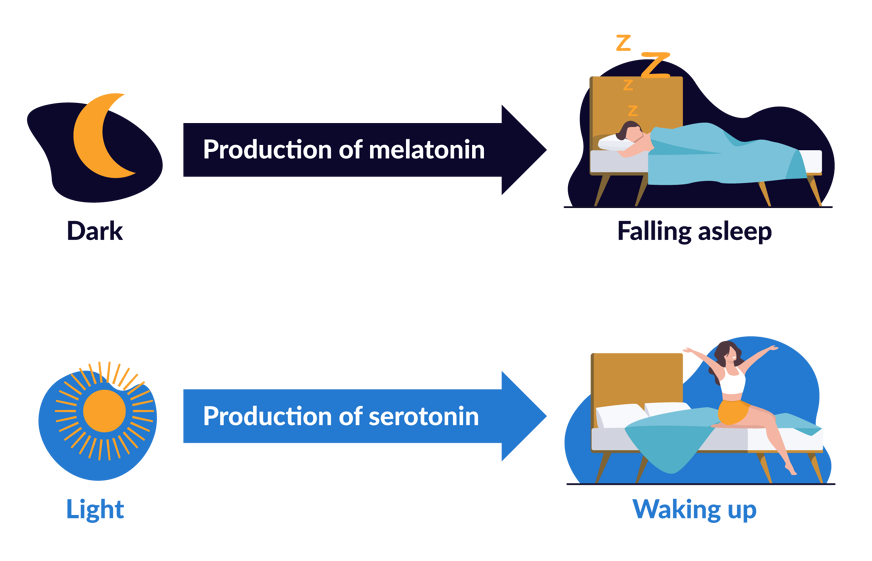
The use of mobile phones before bed negatively impacts sleep latency (the time it takes you to fall asleep) and leads to poorer sleep.
Social media usage and anxiety
While doomscrolling can be rewarding in the sense that your brain thrives on all the new content, there's also no way of guaranteeing that you won't come across negative content that triggers fears, stresses, or anxiety.
By controlling what you absorb before bed, you can also control your stress and relaxation levels, which can lead you to experience good sleep.
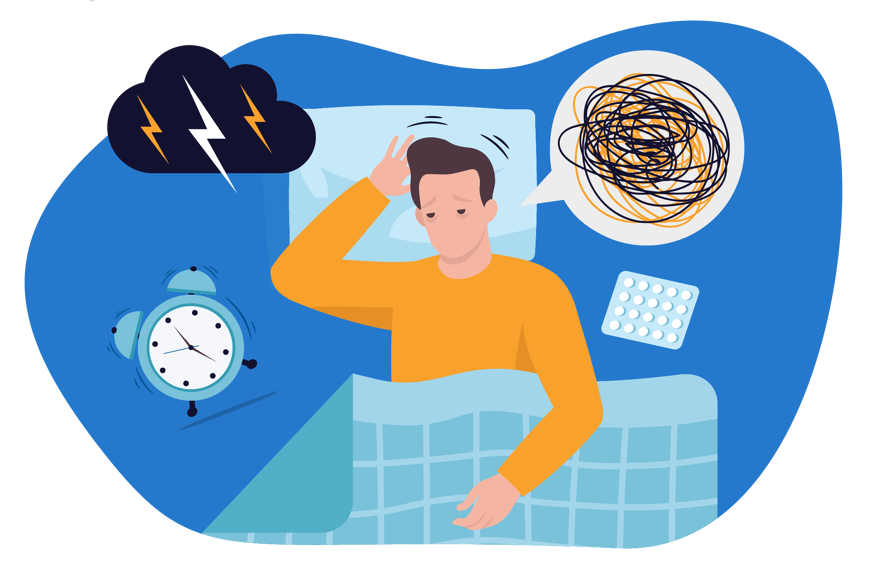
However, unknown content and problematic smartphone use may trigger anxieties, leading to both an inability to fall asleep or restless nights while sleeping.
Both of these lead to a lower quality of sleep.
The side effects of keeping your smartphone near your bed
Next, let's look at some of the smartphone side effects that aren't directly related to phone usage before bed.
Smartphones triggering hypervigilance
It's becoming increasingly difficult to "switch off" and the use of smartphones has certainly heightened this phenomenon.
We have to make a conscious effort to wind down at the end of a long day and give our minds and bodies a chance to recover.
Unfortunately, by keeping your phone near you at night, your subconscious mind tells you that you are ready to answer a call, e-mail, or text.
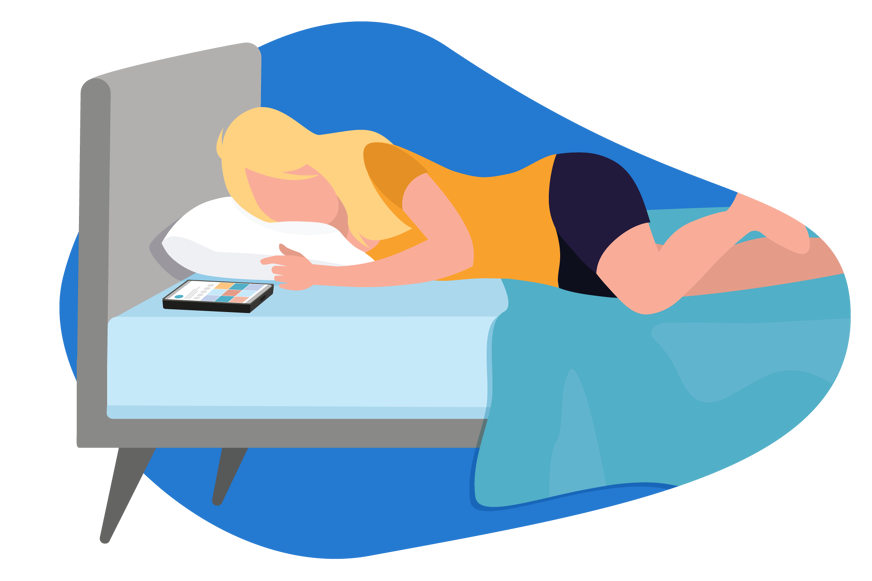
This makes it even more challenging to switch off, keeping you in a state of hypervigilance.
The potentially harmful effects of radiation
Mobile phones emit radiation, which has always been a concern for those who believe this radiation increases the risk of cancer.
At this stage, there is no conclusive scientific evidence [6] that mobile phone usage increases cancer risk.
But, the FDA still recommends some steps to reduce exposure to radiofrequency radiation [7], suggesting that taking a break from your smartphone's radiation may not be a bad idea.
Of course, this doesn't only apply to sleeping, but one way to easily decrease the amount of radiation from your smartphone is by placing it at least a metre away from your bed (or, even better, in another room) or switching your phone off or to flight mode.
If you're uncomfortable doing this, you can at least turn off connections such as Bluetooth or Wi-Fi.
Smartphone notifications impacting REM sleep
Having a smartphone beside your bed can significantly reduce Rapid Eye Movement (REM) sleep, a crucial phase of the sleep cycle associated with dreaming, memory consolidation, and emotional processing.
The presence of a smartphone can lead to increased alertness due to the anticipation of notifications, even if the device is not actively being used, disrupting the natural progression into deeper sleep stages.
Additionally, the emission of blue light from the screen when checking the device at night can suppress melatonin production, making it harder to return to sleep and transition into REM stages.
This reduction in REM sleep can impair cognitive functions and emotional regulation, reducing overall sleep quality.
Tips to combat the negative side effects of smartphones on sleep
While it's good and well to be aware of the harmful effects of mobile phones, it can be difficult to implement changes.
But intervention is important.
Here are a few suggestions that will help you put away your phone and get a better night's rest.
Stop using your phone at least one hour before bed
To safeguard your sleep quality and facilitate a smoother transition to sleep, it's recommended to stop using your phone and other electronic devices at least an hour before bedtime.
This one-hour buffer period allows your brain to unwind and distance itself from the stimulating effects of screen time, including the blue light emission that inhibits melatonin production.
By creating a screen-free zone before sleep, you encourage your body to initiate its natural sleep processes, making it easier to fall asleep and enjoy a more restful night.
Establishing such a routine not only enhances sleep quality but also contributes to better overall health and well-being.
Adopting habits like reading a book or practising relaxation techniques can serve as beneficial alternatives to screen time, further promoting sleep hygiene and setting a conducive environment for quality sleep.
Use blue-light filtering glasses
If you do have to use your smartphone (or another electronic device) closer to your bedtime, blue-light filtering glasses [8] can be helpful.
These glasses are specifically designed to limit your level of blue light exposure.

That said, we'd still recommend turning off all electronic devices at least 30 minutes before bed to give your mind the chance to reset and recover before going to bed.
Switch off your phone when you go to sleep
Switching off your smartphone before you go to sleep or, even better, removing it from your bedroom entirely, fights the side effects of smartphones in two ways:
- It removes the risk of getting into the habit of doom-scrolling.
- It removes the subconscious hypervigilance and negative effects on REM sleep that keeping a phone near your bed may have.
If you're not entirely comfortable turning off your smartphone, you can start by turning off connections such as Bluetooth and Wi-Fi and then work up to switching your phone to flight mode when going to bed.
Practical tips for difficult situations
Not everyone has the luxury of completely disconnecting from or removing their smartphones entirely when going to bed.
University students or young adults renting a room, for example, won't be able to move their phones into another room.
If that's the case, do what you can:
- Minimise or eliminate screen time at least 30 minutes to 1 hour before bed
- Switch your phone over to flight mode or at least turn off Bluetooth and Wi-Fi connections
- Invest in an old-school alarm clock, so you're not reliant on your phone
- Place your phone at the opposite end of your room or into a drawer before you go to bed
- Build a habit of reading a good book before bed to get out of the doom-scrolling habit
Getting a good night's sleep without your mobile phone's harmful effects interfering is only a few changes away.
You can also implement a few sleep-enhancer products, like the below options from Aeyla.
Aeyla's relaxing sleep products:
Is there a way forward where smartphone usage doesn't negatively impact sleep quality?
As we've hopefully shown, there are ways to use your smartphone without negatively affecting sleep quality - simply by following a few rules.
By avoiding screen time at least an hour before bed and switching your phone to flight mode while sleeping, you can set up a healthy sleep routine that affords you the luxury of smartphone usage throughout the day without the negative impacts on sleep.
This way, you can reduce internet addiction, the overuse of smartphones, and smartphone dependence at night for a more restful sleep.
Table of Contents
What are the side effects of using a mobile phone at night?
The side effects of smartphone use before bed
The side effects of keeping your smartphone near your bed
Tips to combat the negative side effects of smartphones on sleep
Is there a way forward where smartphone usage doesn't negatively impact sleep quality?
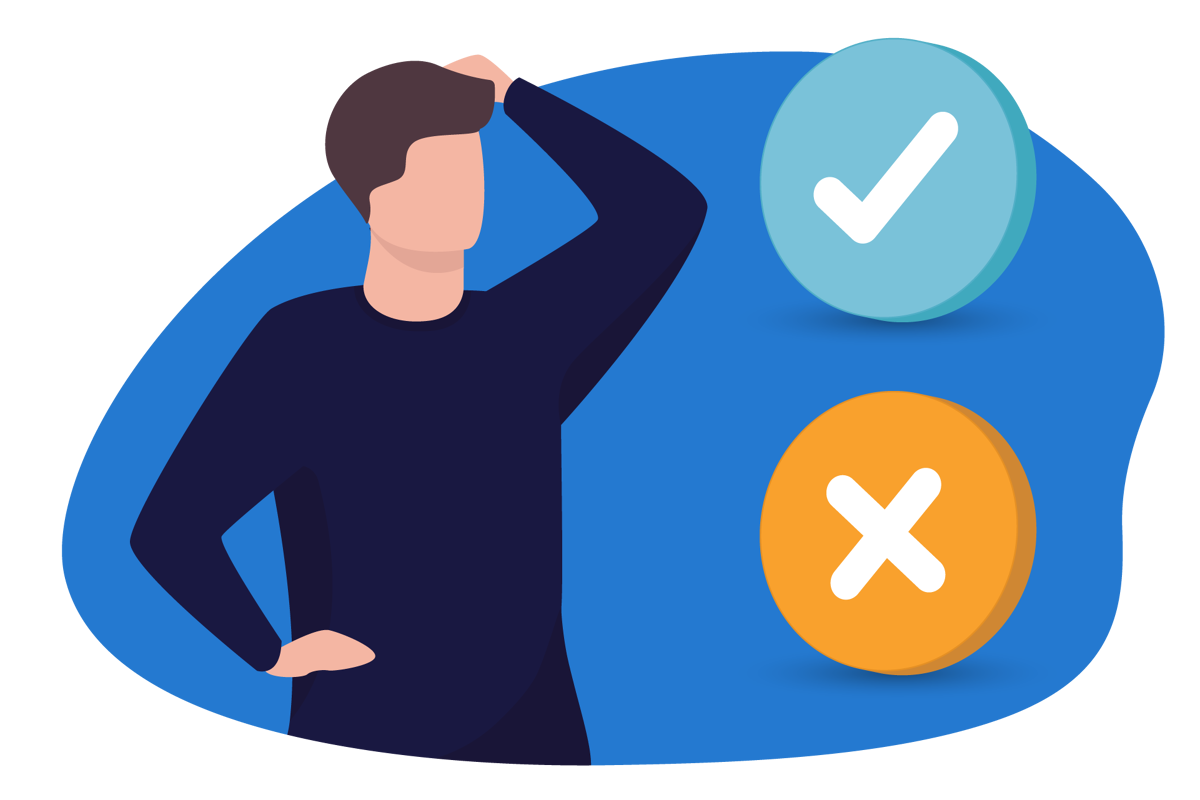






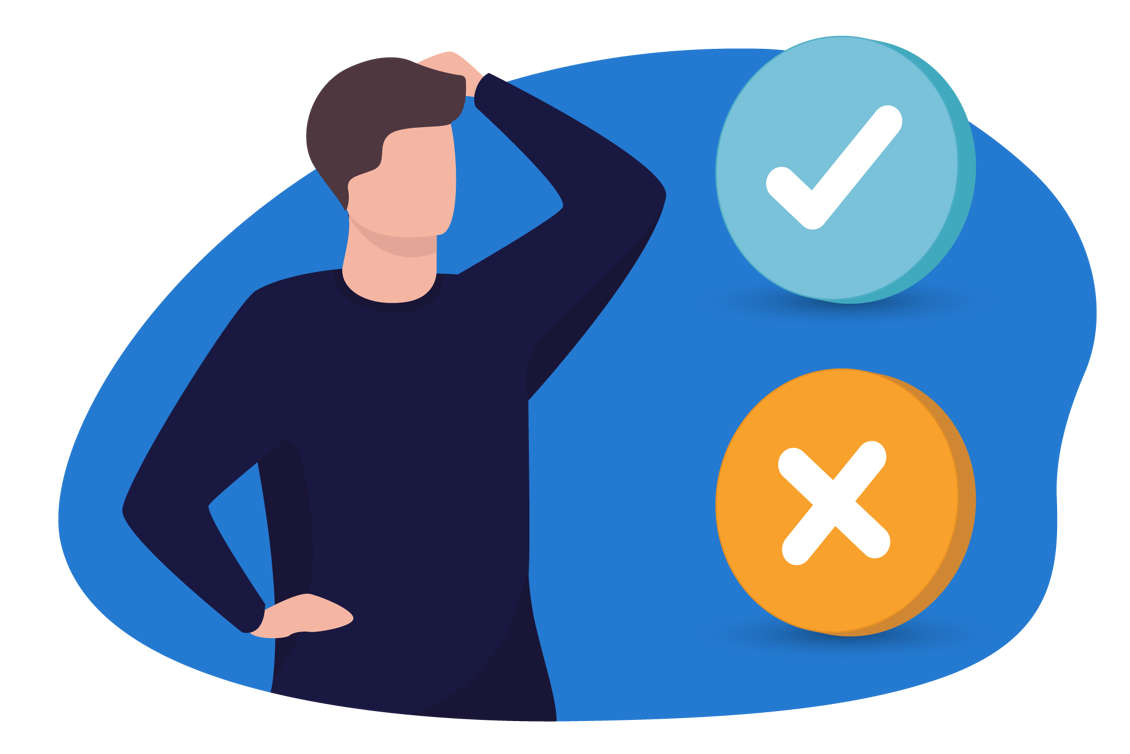




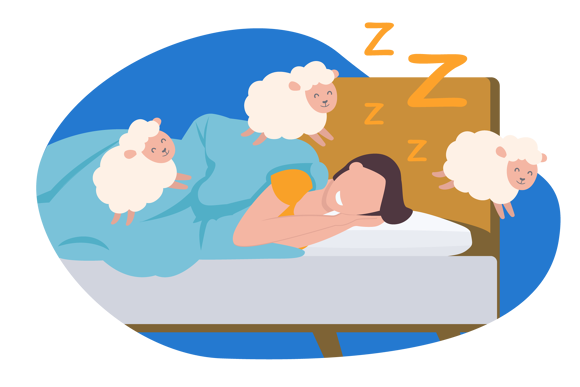

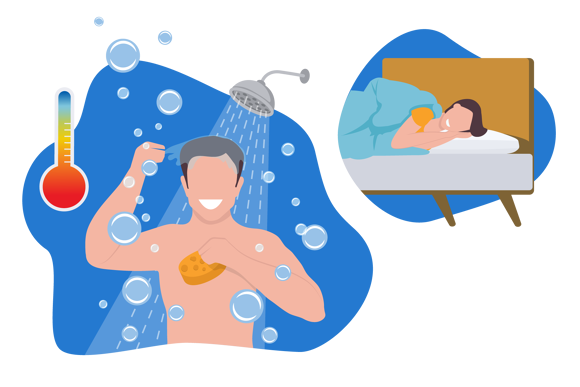


Alternatively, message us directly via the Contact Us page.